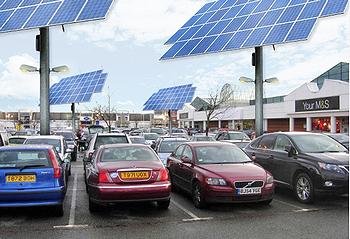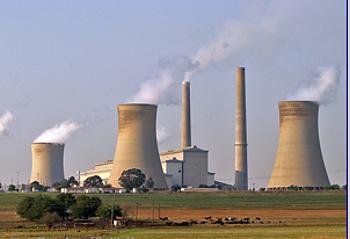Global Business Leaders Urge “Effective” Climate Deal in Durban
LONDON, UK, October 20, 2011 (ENS) – Some of the world’s largest corporations today issued an “urgent call to action” to governments to approve a “robust, equitable and effective agreement” on climate change at the annual UN climate summit set for Durban, South Africa from November 28 to December 9.
A statement endorsed by over 200 companies from the energy, finance, retail, and manufacturing sectors calls for “a carbon price sufficient to drive necessary emissions reductions” and “an end to fossil fuel subsidies.”
Corporations from 29 countries called on governments to “break the deadlock” that has stalled climate negotiations for years – as rich countries and developing countries battle over such issues as whether to continue the Kyoto Protocol past expiration of its first commitment period at the end of 2012, and billions in funding to help poor countries cope with climate change.
 |
New wind turbine supplies 17% of the power at Proctor and Gamble’s pet care plant in Coevorden, Netherlands, January 2011 (Image courtesy P&G) |
Shell, Unilever, Tesco, Johnson and Johnson, Ricoh, Cemex, Proctor & Gamble, Nedbank, the Lloyd’s Banking Group and Vale are among the companies endorsing the “2°C Challenge Communique,” released today by the newly formed Corporate Leaders’ Network for Climate Action.
The 2°C stands for two degrees Celsius (3.6 degrees Fahrenheit), the global average temperature increase above pre-industrial levels that most scientists say would avert the worst consequences of climate change.
Scientists from around the world said in 2007 that the global surface temperature had increased by 0.76 degrees Celsius (1.3 degrees F) since the Industrial Revolution began in 1750.
 |
Truett Tate, Lloyds Banking Group |
Truett Tate, vice chairman, Lloyds Banking Group, said, “Climate change is one of the most important environmental issues of our time. Effecting change will require a concerted effort between businesses, governments as well as individuals. Lloyds Banking Group remains firmly committed to the important role it can play in this area, from financing renewable energy to helping our customers transition to a low carbon economy.”
The corporations say their goal in releasing the communique is to influence governments ahead of the 17th Conference of the Parties to the UN Framework Convention on Climate Change, UNFCCC.
“Time is running out to keep global warming under 2°C and, if they fail to act, governments “risk permanent damage to their credibility,” the corporate leaders warn.
 |
Solar power is generated by arrays in a Tesco parking lot (Photo courtesy SRE Technologies Ltd) |
“The window to stabilise global warming to less than 2°C, as agreed in Cancun, has almost closed,” they state. “The International Energy Agency has shown that CO2 emissions in 2010 were the highest on record, and are still rising. While there are examples of strong policies and actions to prevent dangerous climate change, with current progress we will cross the 2°C boundary.”
Without a global deal “business will have insufficient clarity or certainty of action to invest to its full potential,” the statement warns.
But right action would “secure a low carbon-emission economy that is more resilient, more efficient and less vulnerable to global shock,” they assert.
The UN’s top climate official, UNFCCC Executive Secretary Christiana Figueres, said, “The companies endorsing the 2°C Challenge Communique set a great example.”
She said, “Corporate leadership that provides powerful vocal support for action gives governments the greater confidence they need to move forward a global climate change agreement that will ultimately cover the current ambition gap.”
At Durban, the corporations are calling on governments to put in place an international agreement that provides:
- a reformed Clean Development Mechanism that provides effective finance flows while protecting environmental outcomes. The CDM allows projects in developing countries to earn certified emission reduction credits, each equivalent to one metric tonne of the greenhouse gas carbon dioxide. The credits can be traded, sold, and used by industrialized countries to a meet their emission reduction targets under the Kyoto Protocol.
- Technology Transfer and Adaptation committees
- an “operationalised” Green Climate Fund
Last year, negotiators from 194 nations agreed to create the Green Climate Fund to channel up to US$100 billion a year by 2020 to developing countries.
But negotiations over the mechanics of the Green Climate Fund broke down this week at a meeting of the Transitional Committee in Cape Town, South Africa. On Tuesday, the United States and Saudi Arabia withdrew their support for the overall design of the fund that is backed by all other countries.
 |
Coal-fired power plant in Mpumalanga, South Africa (Photo courtesy Eskom) |
Regardless of this and other setbacks, the corporate leaders today urged governments to take “immediate action at the national level,” to curb climate change without waiting for a new international treaty to be in place.
Among the actions that companies are asking all national goverments to adopt are:
- A carbon price sufficient to drive necessary emissions reductions
- Effective adaptation programs
- Increased funding for innovation, investment and low-carbon development
- Help for businesses and consumers to cut emissions by using energy more efficiently
- Targeted regulation and procurement, together with new thinking on intellectual property rights to encourage low-carbon innovation
- Action to conserve and increase forests and other land-based carbon sinks
- International agreement to establish and maintain strong institutions including a reformed Clean Development Mechanism and a Green Climate Fund that is operational
- An end to fossil fuel subsidies
The Corporate Leaders’ Network for Climate Action includes groups from Brazil, Chile, the European Union, Hong Kong, Mexico, Asia, Southeast Asia, South Africa, and the United States.
 |
Natural gas powered fuel cell supplies 25% of the energy to the Sheraton Edison Raritan Center in Connecticut, USA (Photo courtesy PPL Renewable Energy) |
The communique is the fifth in a series of statements initiated by The Prince of Wales’s Corporate Leaders’ Group on Climate Change and managed and developed by the University of Cambridge Programme for Sustainability Leadership.
Eliot Whittington, director of The Prince of Wales’s UK Corporate Leaders’ Group on Climate Change, said, “The expansion of the network to include business groups from other countries shows that, far from losing interest in climate change as an issue, there is an emerging and increasingly international consensus amongst enlightened corporate leaders of the need for urgent action.”
“We will be taking signatures up to June next year and look forward to being joined by other businesses,” said Whittington.
In spite of the unfavorable economic outlook and the lack of recent progress at the multilateral level, the statement urges governments not to “let short-term concerns, however important, drive climate change off the agenda.”
“As business leaders, we believe that the only sustainable future for our companies and for the globe is to build a robust, green, climate-resilient economy.”
Copyright Environment News Service (ENS) 2011. All rights reserved.
© 2011 – 2012, Environment News Service. All rights reserved. Content may be quoted only with proper attribution and a direct link to the original article. Full reproduction is prohibited.
